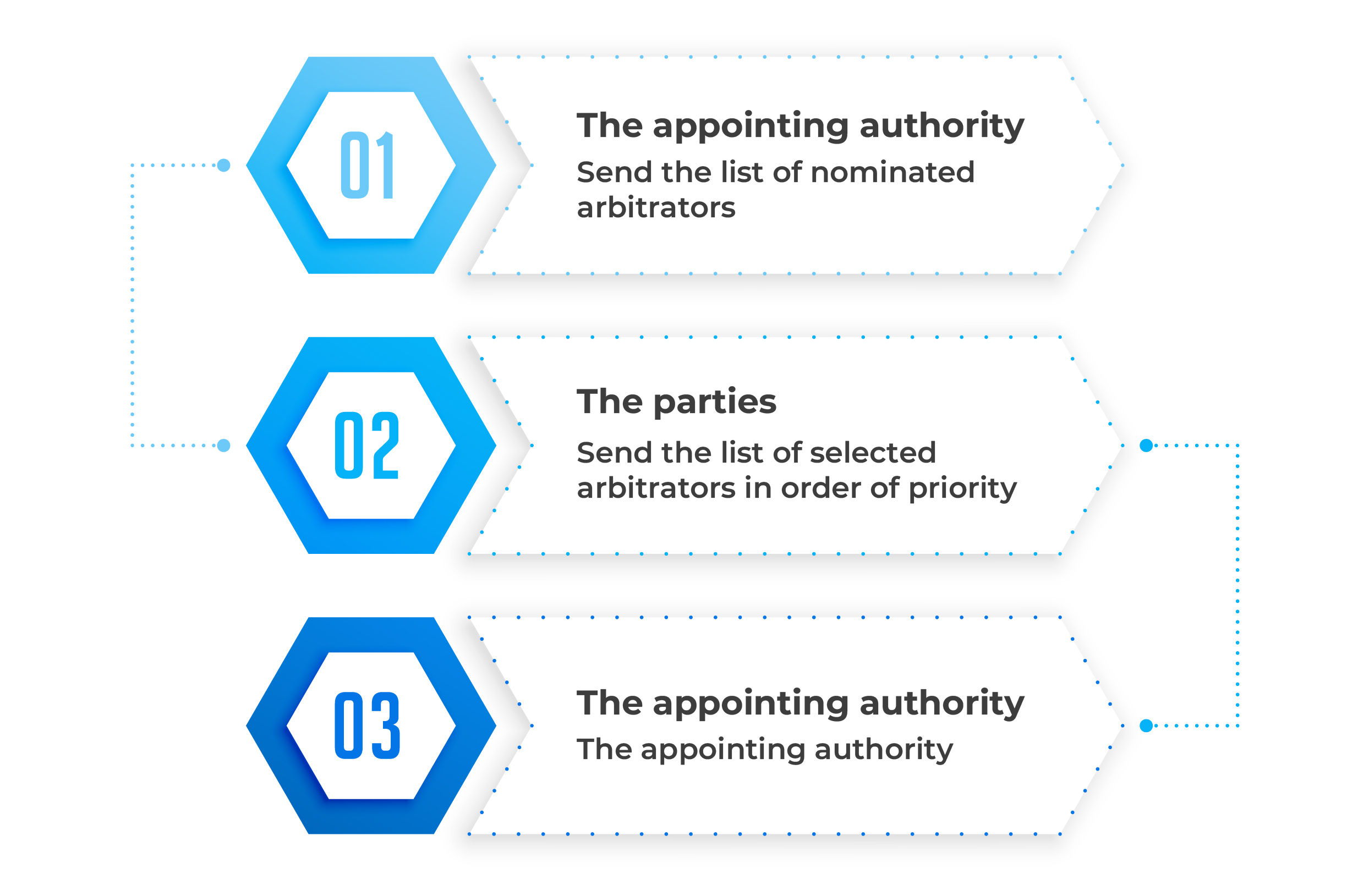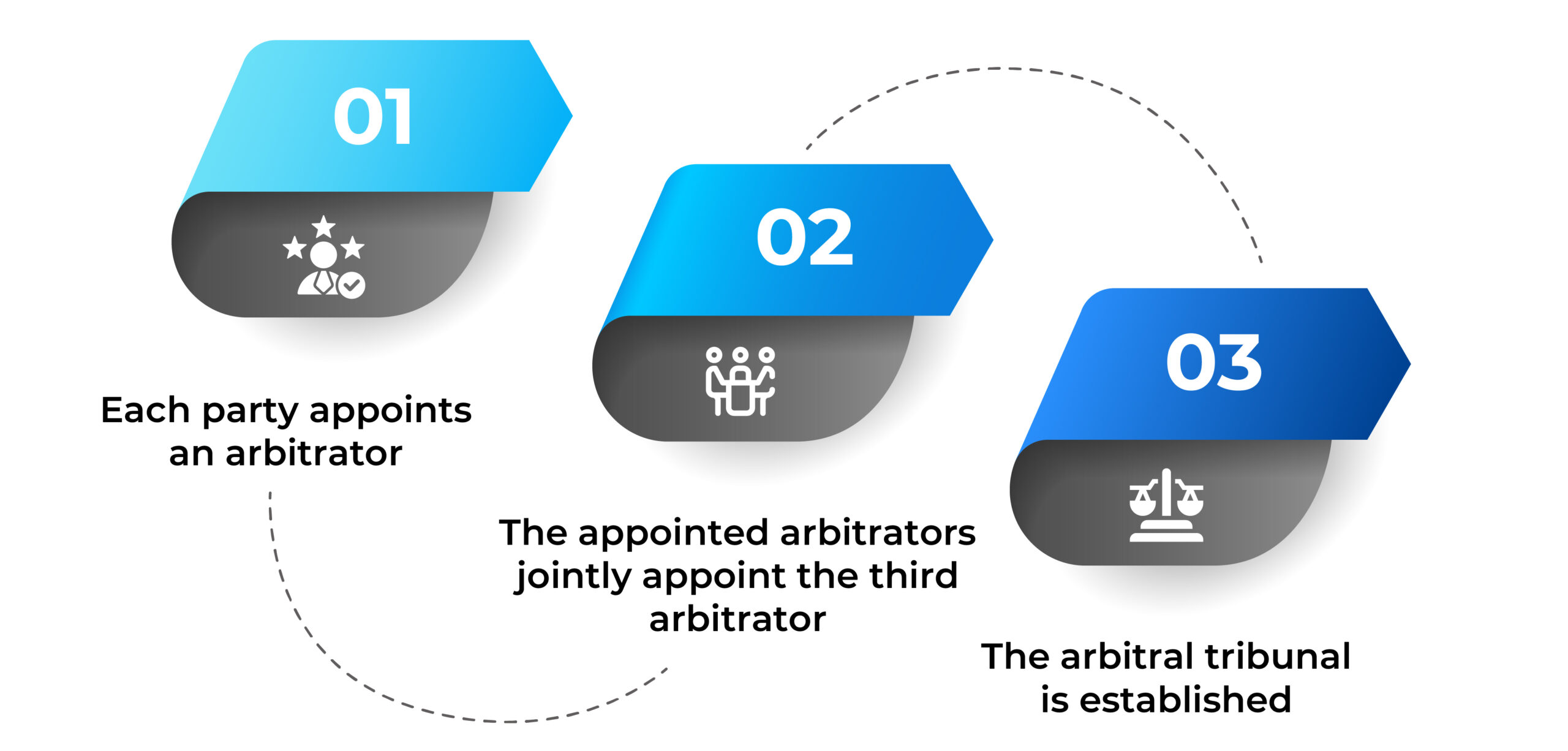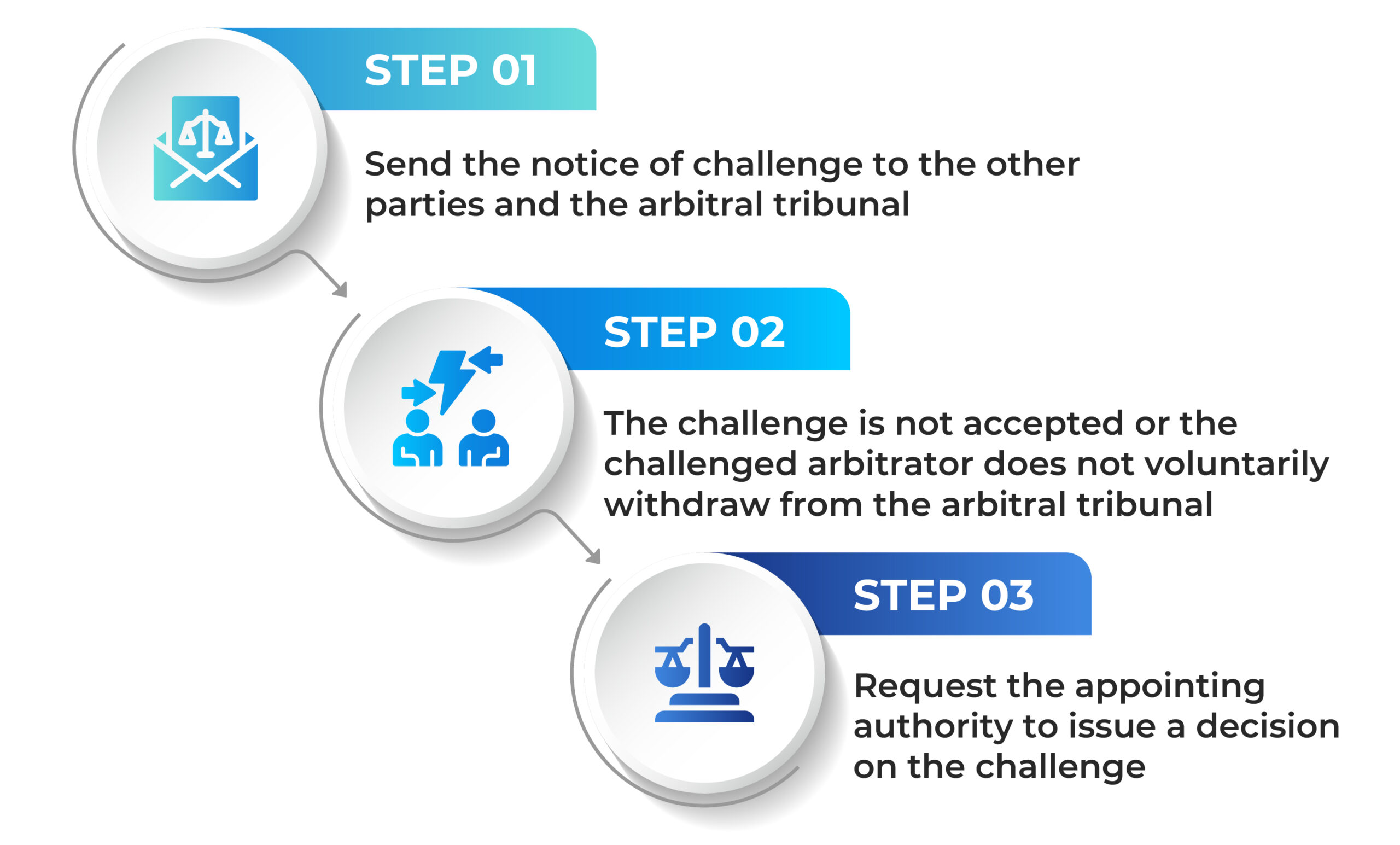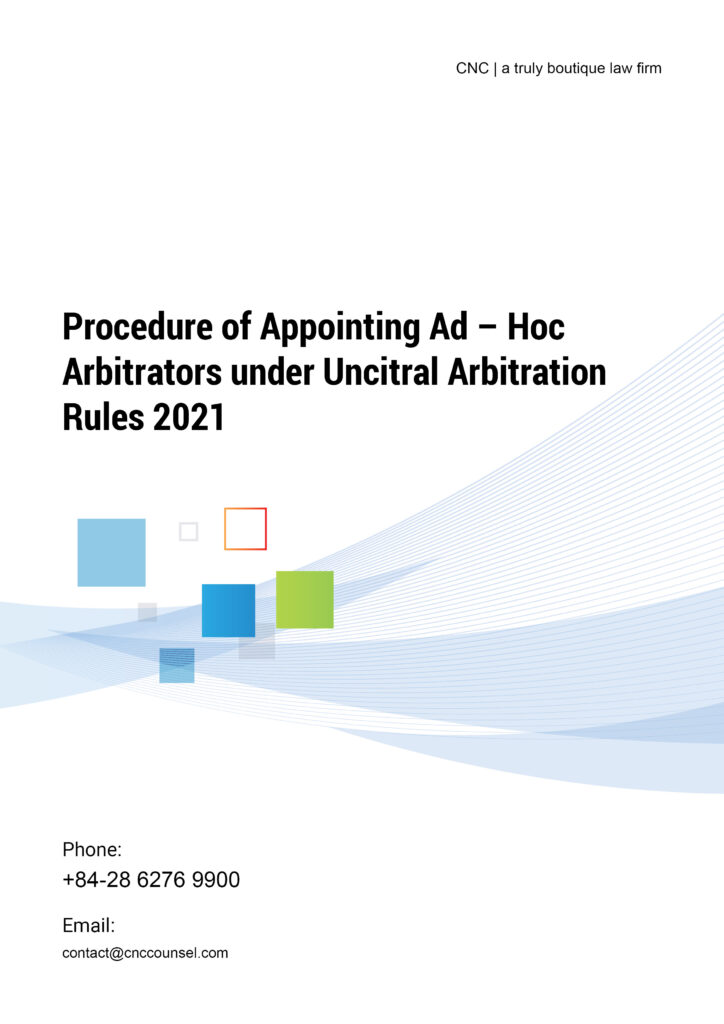Procedure of Appointing Ad – Hoc Arbitrators under Uncitral Arbitration Rules 2021
Amid the rapid growth of international trade as well as the increase of commercial disputes, selecting an appropriate dispute resolution mechanism is crucial to ensuring transparency and equity among business partners. In this regard, ad hoc arbitration is often favored as it affords parties the autonomy to choose or set up procedural rules without being restricted to the frameworks established by arbitral institutions. However, in order to effectively leverage this method, parties should consider well-established principles inscribed in the UNCITRAL Arbitration Rules 2021, particularly those concerning the appointment of arbitrators.
This article provides a concise overview of the fundamental procedures for appointing arbitrators in ad hoc arbitration under the UNCITRAL Arbitration Rules 2021.
Download PDF file here
Overview of Ad Hoc Arbitration and the UNCITRAL Arbitration Rules 2021
Ad Hoc Arbitration
In the context of dispute resolution through arbitration, the parties to a dispute may agree on one of two mechanisms: institutional arbitration or ad hoc arbitration. Institutional arbitration is established based on the rules of an arbitral institution, whereas ad hoc arbitration operates independently of such institutions.[1]
When opting for ad hoc arbitration, the parties have the flexibility to devise their own procedural rules, provided these rules adhere to the nature and foundational principles of arbitration. In terms of nature, these rules must treat the parties fairly and afford each party an equal opportunity to substantiate their claims. In theory, the parties negotiate on their own applicable arbitration rules; however, in practice, they typically rely on established frameworks, such as the UNCITRAL Arbitration Rules 2021. These rules provide the arbitral tribunal and the parties with a reasonable procedural structure which the parties can further supplement with additional provisions as desired.[2]
UNCITRAL Arbitration Rules 2021
The UNCITRAL Expedited Arbitration Rules 2021 (“EAR”), adopted by the United Nations Commission on International Trade Law (UNCITRAL) on July 21, 2021 and took effect on September 19, 2021, were established to provide a framework for expedited arbitration. This streamlined procedure aims to optimize time and cost efficiency in dispute resolution, particularly for disputes of relatively low value or with less complex issues. EAR’s provisions play a significant role in ensuring the efficiency and rationality of arbitration proceedings while balancing the interests of the parties.[3]
Regarding their scope of application, the EAR serves as an annex to the UNCITRAL Arbitration Rules (“UARs”), as referenced in Article 5(1), which stipulates that the EAR may be applied if the parties expressly agree.[4] Specifically, an agreement to apply the UARs for dispute resolution does not automatically entail the application of the EAR unless the parties explicitly consent. Parties may choose to apply the EAR in investment arbitration or ad hoc arbitration, and once agreed upon, the EAR provisions can be adjusted to suit the parties’ procedural needs, provided no party objects to such adjustments.[5]
Procedure for appointing arbitrators in Ad Hoc Arbitration under the UNCITRAL Expedited Arbitration Rules 2021
Appointing Authority
The appointing authority plays a pivotal role in ensuring that the arbitration process is conducted efficiently and consistently. Arbitration rules typically empower the appointing authority to facilitate and expedite the constitution of the arbitral tribunal in cases where one party fails to appoint an arbitrator or the parties cannot agree on the appointment. Additionally, the appointing authority may address matters concerning the independence and impartiality of arbitrators or resolve disputes regarding the determination of arbitration fees.[6]
Article 6 of the EAR provides detailed provisions on the designation and appointment of the appointing authority. Accordingly, the Secretary-General of the Permanent Court of Arbitration at the Hague (PCA) is vested with the authority to designate an appointing authority if the parties fail to agree on one. The process for establishing the appointing authority is outlined as follows:
- Step 1: The parties attempt to reach an agreement, with one party proposing the names of one or more individuals or institutions to serve as the appointing authority.[7] If the parties encounter an issue that, under the rules, requires referral to an appointing authority within a period of time, and no appointing authority has yet been established, that timeframe will be suspended from the date a party initiates the procedure to agree on or designate an appointing authority until such agreement or designation is achieved.[8]
- Step 2: The appointing authority shall be established if the parties reach an agreement within 30 days from the date of a party’s proposal. If no agreement is reached within this period, any party may request the PCA to designate an appointing authority.[9] Furthermore, if the appointed authority refuses to perform its duties, fails to appoint an arbitrator within 30 days after the receipt of a party’s request, fails to perform its duties within any other prescribed period of time, or fails to decide on an arbitrator challenge within a reasonable time after receiving a party’s request, any party may request the PCA to designate a substitute appointing authority.[10]
Appointment of arbitrators
When the parties agree to resolve disputes through ad hoc arbitration, they are free to determine the number of arbitrators. In the absence of a prior agreement or if the parties fail to reach an agreement within 30 days from the date the respondent receives the notice of arbitration, the arbitral tribunal shall, by default, consist of three arbitrators.[11] The requirement for an odd number of arbitrators ensures a majority vote, thereby minimizing delays in the tribunal’s issuance of the final award. Furthermore, in practice it is evident that a tribunal comprising three arbitrators enhances the accuracy and impartiality of the arbitral award as each party appoints one arbitrator, each is equipped with distinct expertise and they can engage in discussions before rendering the final decision.[12]
Regarding the arbitrator appointment process, if the arbitral tribunal cannot be constituted under the provisions of EAR, the appointing authority shall, upon the request of any party, establish the arbitral tribunal. In doing so, it may revoke any prior appointments, appoint or reappoint each arbitrator, and designate one of them as the presiding arbitrator.[13] If the tribunal can be constituted under the EAR, the arbitrator appointment process is conducted as follows:
The sole arbitrator:
The parties shall jointly agree to appoint a sole arbitrator. If, within 30 days from the date all parties receive the notice requesting the appointment of a sole arbitrator but no agreement is reached, the sole arbitrator shall be appointed by the appointing authority upon the request of a party,[14] accompanied by a copy of the request for arbitration and any response thereto[15]. The appointment process by the appointing authority is as follows:
- Step 1: The appointing authority provides the parties with a list of at least three nominated arbitrators.
- Step 2: Within 15 days of receiving the list of nominees, each party shall return to the appointing authority a list indicating the arbitrators they approve by striking out those they object to and numbering the remaining names in order of preference.
- Step 3: The appointing authority appoints the sole arbitrator based on the parties’ prioritized lists.[16]

Appointment of the sole arbitrator
If, for any reason, the appointment cannot be carried out following the steps outlined above, the appointing authority may, at its own discretion, exercise the power to appoint the sole arbitrator.[17] It should be noted that the above procedure does not apply if the parties do not agree to its application or if the appointing authority, at its discretion, deems it unsuitable for the case and chooses not to apply it.[18]
Additionally, if no response is received from the other party regarding a proposal to appoint a sole arbitrator within the time limit as provided, or if one or more parties fail to appoint the second arbitrator for a three-arbitrator tribunal, the appointing authority may, at the request of a party, appoint a sole arbitrator in accordance with the above procedure provided it determines that such an appointment is necessary given the circumstances of the case.[19]
Tribunal of three arbitrators:
In principle, each party shall appoint one arbitrator and the appointed arbitrators then jointly appoint the third arbitrator, who also serves as the presiding arbitrator. The process is as follows:
- Step 1: A party sends a notice regarding the appointment of the first arbitrator. Upon receiving this notice, the other party shall respond with the appointment of the second arbitrator within 30 days from the date of receipt. If the second arbitrator is not appointed within this period, the first party may request the appointing authority to appoint the second arbitrator.
- Step 2: The two appointed arbitrators shall agree on the appointment of the third arbitrator, who will also serve as the presiding arbitrator, within 30 days from the date the second arbitrator is appointed. If no agreement is reached within this period of time, the appointing authority will appoint the presiding arbitrator following a procedure similar to that of appointing a sole arbitrator.[20]

Appointment of three arbitrators
It should be noted that, in cases involving multiple claimants or multiple respondents, the parties on each side shall jointly agree on the arbitrator to be appointed unless the parties have agreed otherwise.[21]
Tribunal with other numbers of Arbitrators
In the event that the parties agree on a number of arbitrators other than one or three, the procedure for appointing the arbitral tribunal shall be conducted in accordance with the method agreed upon by the parties.[22]
Replacement of an arbitrator
Grounds for replacement of an arbitrator
The appointment of a substitute arbitrator follows a process similar to the initial arbitrator appointment procedure. This process remains applicable even if a party fails to exercise its right to appoint or does not participate in the appointment process.
Furthermore, the appointing authority, upon the request of a party or in exceptional circumstances where it deems it necessary to revoke a party’s right to appoint the substitute arbitrator, after giving the parties and the remaining arbitrators an opportunity to present their views, may appoint the substitute arbitrator. Alternatively, if the arbitration hearings have concluded, the appointing authority may also authorize the remaining arbitrators to continue the arbitration proceedings and issue any decisions or awards.[23] An arbitrator may be challenged and replaced if they fail to meet the following criteria:
Independence and impartiality
The appointment of a suitable arbitral tribunal is critical to ensuring the effective resolution of disputes and minimizing the risk of an arbitral award being annuled later. Therefore, ensuring the arbitrator’s independence and impartiality is a fundamental principle in the appointment of arbitrators. An arbitrator is considered independent if they have no financial connection or relationship with the parties to the dispute and impartial if they do not favor any party or any matter in the dispute.[24] This means that, upon appointment or during the arbitration process, arbitrators must disclose any information that could raise doubts about their independence or impartiality.[25]
Moreover, if the parties have grounds to question the independence or impartiality of an appointed arbitrator, they may challenge the arbitrator’s eligibility to participate in the dispute resolution.[26] A party may only challenge its appointed arbitrator if it becomes aware of the arbitrator’s lack of independence or impartiality after the appointment.[27] This provision is designed to uphold the principle of respecting the parties’ freedom of agreement in arbitration, as appointing an arbitrator who is neither independent nor impartial would contravene the parties’ intent for a fair and transparent dispute settlement which has always been the expectation of the parties when choosing arbitration as the dispute resolution method.
Ability to perform an arbitrator’s duties
There are two primary scenarios in which an arbitrator may be unable to fulfill their role in resolving a dispute as required by the parties: legal inability (De Jure Inability) and practical inability (De Facto Inability). [28] Legal inability occurs when an arbitrator does not meet the legal requirements for arbitration under applicable law, such as being bankrupt or convicted of a criminal offense. [29] Practical inability arises when an arbitrator, for personal reasons, cannot continue participating in the arbitration proceedings, such as illness.[30]
Besides, the parties may challenge an arbitrator’s eligibility if the arbitrator fails to fulfill their duties for any other reason.[31] For instance, regarding competence, although most international arbitration laws do not mandate that arbitrators possess specific expertise, they must at least have sufficient capability to ensure the smooth conduct of proceedings and to issue awards that address the parties’ issues. Failure to perform their role during the proceedings may result in an arbitrator’s removal from the Arbitral Tribunal.[32]
Procedure for challenging an arbitrator
If the parties have sufficient grounds to believe that an arbitrator lacks independence, impartiality, or the ability to perform their duties, they may challenge the eligibility of the appointed arbitrator. The challenge procedure is conducted as follows, unless the parties have agreed otherwise:
(i) Within 15 days from the date of becoming aware of the arbitrator’s appointment or of the arbitrator’s lack of independence, impartiality, or inability to perform their duties, the challenging party shall send a notice of its challenge to the other parties, the challenged arbitrator, and the other arbitrators. Upon receiving the notice of challenge, the notified parties may choose to agree to the challenge and the challenged arbitrator may choose to voluntarily withdraw from the arbitral tribunal.
(ii) If the challenge is not agreed by the other parties or the challenged arbitrator does not voluntarily withdraw from the arbitral tribunal within 15 days of the receipt of the notice, the challenging party shall, if further pursuit of the challenge is desired, request the appointing authority to issue a decision on the challenge within 30 days of the notice of challenge.[33]

Procedure for the challenge of an arbitrator
It should be noted that an arbitrator’s voluntary withdrawal from the arbitral tribunal or the parties’ agreement to a challenge against an arbitrator’s eligibility does not imply acceptance of the legal validity of the grounds cited by a party for the challenge.[34] In practice, disputes often reveal instances where parties challenge an arbitrator’s eligibility for tactical reasons, aiming to benefit from delaying the dispute resolution process. Consequently, an arbitrator’s voluntary withdrawal or a party’s agreement to terminate an arbitrator’s mandate may stem from a desire to expedite the resolution of the dispute.[35]
Conclusion
The procedure for appointing arbitrators in ad hoc arbitration under the UNCITRAL Arbitration Rules 2021 is designed based on the principle of respecting the parties’ freedom of agreement while ensuring the independence and impartiality of the arbitral tribunal, thereby guaranteeing fairness and efficiency in the dispute resolution process. Observedly, UNCITRAL Expedited Arbitration Rules 2021 serve as a particularly important reference for parties who choose to resolve disputes via ad hoc arbitration, especially when they are unable to independently establish their own procedural framework.
Writen by
 |
Tran Pham Hoang Tung I Senior Associate
Phone: (84) 901 334 192 Email: tung.tran@cnccounsel.com |
 |
Pham Ngoc Thanh Tra I Collaborator
Phone: (84) 347 924 900 |
[1] Article 3.6 and 3.7 of Law on Commercial Arbitration 2010
[2] Nigel Blackaby, Constatine Partasides QC, Alan Redfern, Martin Hunter, Redfern and Hunter on International Arbitration (Sixth Edition), Oxford University (2015), paragraph 1.140 – 1.141
[3] Expedited Arbitration Rules (2021), United Nations Commission On International Trade Law, <https://uncitral.un.org/en/content/expedited-arbitration-rules> accessed on June 9, 2025
[4] UNCITRAL’s Expedited Arbitration Rules: 15 Q&A’s to get you up to speed (08/2021), Mayer Brown Legal Update <https://www.mayerbrown.com/-/media/files/perspectives-events/publications/2021/08/uncitrals-expedited-arbitration-rules.pdf> accessed on June 9, 2025
[5] Article 1.1 of UNCITRAL Arbitration Rules 2021
[6] Spotlight on the PCA’s Appointing Authority Activities, <https://docs.pca-cpa.org/2019/04/EN-Spotlight-on-the-PCAs-Appointing-Authority-Activities-1.pdf> accessed on June 9, 2025
[7] Article 6.1 of UNCITRAL Arbitration Rules 2021
[8] Article 6.3 of UNCITRAL Arbitration Rules 2021
[9] Article 6.2 of UNCITRAL Arbitration Rules 2021
[10] Article 6.4 of UNCITRAL Arbitration Rules 2021
[11] Article 7.1, UNCITRAL Arbitration Rules 2021
[12] Aceris Law, The Choice Between One and Three Arbitrators, <https://www.acerislaw.com/the-choice-between-one-and-three-arbitrators/>
[13] Article 10.3 of UNCITRAL Arbitration Rules 2021
[14] Article 8.1 of UNCITRAL Arbitration Rules 2021
[15] Article 6.6 of UNCITRAL Arbitration Rules 2021
[16] Article 8.2 of UNCITRAL Arbitration Rules 2021
[17] ibid
[18] ibid
[19] Article 7.2 of UNCITRAL Arbitration Rules 2021
[20] Article 9 of UNCITRAL Arbitration Rules 2021
[21] Article 10.1 of UNCITRAL Arbitration Rules 2021
[22] Article 10.2 of UNCITRAL Arbitration Rules 2021
[23] Article 14 of UNCITRAL Expedited Arbitration Rules 2021
[24] Gavan Griffith & Andrew D Mitchell, ‘Contractual dispute resolution in International Trade: the UNCITRAL Expedited Arbitration Rules (1976) and the Uncitral Conciliation Rules (1980)’, Melbourne Law School Vol 3, pages 6-7<https://law.unimelb.edu.au/__data/assets/pdf_file/0004/1680241/Griffith-and-Mitchell.pdf> accessed on June 9, 2025
[25] Article 11 of UNCITRAL Expedited Arbitration Rules 2021
[26] Article 12.1 of UNCITRAL Expedited Arbitration Rules 2021
[27] Article 12.2 of UNCITRAL Expedited Arbitration Rules 2021
[28] Article 12.3 of UNCITRAL Expedited Arbitration Rules 2021
[29] Kartikeya Awasthi, ‘Termination of Mandate of the Arbitrator’, VIA Mediation Centre, <https://viamediationcentre.org/readnews/MTAxNw==/Termination-of-Mandate-of-the-Arbitrator> accessed on June 9, 2025
[30] ibid
[31] Article 12.3 of UNCITRAL Arbitration Rules 2021
[32] Michal Malacka (2017), ‘Party Autonomy in the Procedure of Appointing Arbitrators’, Faculty of Law, Palacky University Olomouc, Czech Republic: Vol. 17, No. 2, page 104-105 <https://intapi.sciendo.com/pdf/10.2478/iclr-2018-0017> accessed on June 9, 2025
[33] Article 13 of UNCITRAL Arbitration Rules 2021
[34] Article 13.3 of UNCITRAL Arbitration Rules 2021
[35] Gavan Griffith & Andrew D Mitchell, ‘Contractual dispute resolution in International Trade: the UNCITRAL Expedited Arbitration Rules (1976) and the Uncitral Conciliation Rules (1980)’, (n 8) page 7




